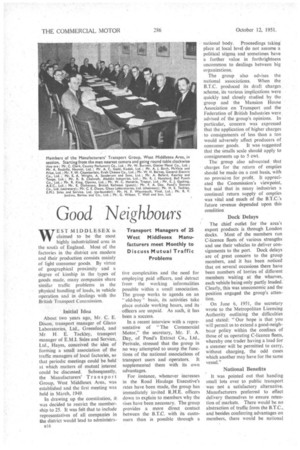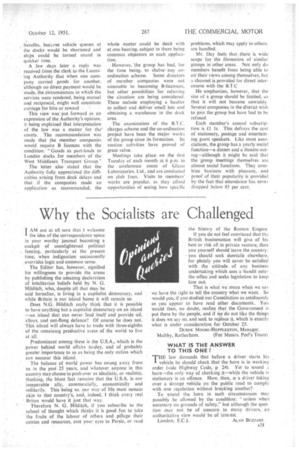Good Neighbours
Page 50

Page 51

If you've noticed an error in this article please click here to report it so we can fix it.
Transport Managers of 25 West Middlesex Manufacturers meet Monthly to Discuss Mutual Traffic Problems
WEST .MIDDLESEX is claimed to be the most highly industrialized area in
• the south of England. Most of the factories in the district are modern and, their production consists mainly of light consumer goods. By virtue of geographical proximity and a degree of kinship in the types of goods made, many companies share similar traffic problems in the physical handling of loads, in vehicle operation and in dealings with the British Transport Commission.
Initial Idea
About two years ago, Mr. C. E. Dixon, transport manager of Glaxo Laboratories, Ltd., Greenford, and Mr. H. E. Tackley, transport manager of E.M.I. Sales and Service, Ltd., Hayes, conceived the idea of forming a small association of the traffic managers of local factories, so that periodic meetings could be held at which matters of mutual interest could be discussed. Subsequently, the Manufacturers' Transport Group, West Middlesex Area, was established and the first meeting was held in March, 1949.
In drawing up the constitution, it was decided to restrict the membership to 25. It was felt that to include representatives of all companies in the district would lead to administra nt 6 tive complexities and the need for employing paid officers, and detract from the working informalities possible within a small association. The group works to agenda on an " olthboy " basis, its activities take place outside working hours, and its officers are unpaid. As such, it has been a success.
In a recent interview with a representative of "The Commercial Motor," the secretary, Mr. F. A. Day, of Pond's Extract Co., Ltd., Perivale, stressed that the group in no way attempted to usurp the functions of the national associations of transport users and operators. It supplemented them with its own advantages.
For instance, whenever increases in the Road Haulage Executive's rates have been made, the group has immediately invited R.H.E. officers down to explain to members why the rises have been necessary. The group provides a more direct contact between the B.T.C. with its custoiners than is possible through a
national body. Proceedings taking place at local level do not assume a political stigma and sometimes have a further value in forthrightness uncommon to dealings between big organizations.
The group also advises the national associations. When the B.T.C. produced its draft charges scheme, its various implications were quickly and closely studied by the group and the Mansion House Association on Transport and the Federation of British Industries were advised of the group's opinions. In particular, concern was expressed that the application of higher charges to consignments of less than a ton would adversely affect producers of consumer goods. It was suggested that the smalls scale should apply to consignments up to 5 cwt.
The group also advocated that charges for the return of empties should be made on a cost basis, with no provision for profit. It appreciated the Commission's viewpoint, but said that in many industries a continual return supply of empties was vital and much of the B.T.C.'s future revenue depended upon this condition
Dock Delays
The chief outlet for the area's export products is through London docks. Most of the members run C-licence fleets of various strengths and use their vehicles to deliver consignments to the port. Dock delays are of great concern to the group members, and it has been noticed that on several occasions there have been numbers of lorries of different members waiting at the wharves, each vehicle being only partly loaded.* Clearly, this was uneconomic and the position engaged the group's attention.
On June 6, 1951, the secretary wrote to the Metropolitan Licensing Authority outlining the difficulties and stated: " Our hope is that you will permit us to extend a good-neighbour policy within the confines of those of us operating C-licence fleets, whereby one trader having a load for a steamer will be permitted to carry, without charging, the odd cases which another may have for the same vessel."
National Benefits
It was pointed out that handing small lots over to public transport was not a satisfactory alternative. Manufacturers preferred to effect delivery themselves to ensure retention of markets. There would be no abstraction of traffic from the B.T.C., and besides conferring advantages on members, there would be national beriefits, because vehicle queues at the docks would be shortened and ships could be turned round in quicker time.
A few days later a reply was received from the clerk to the LicenS
• ing Authority • that . When one company carried goods for another, although no direct payment would be 'Made, the 'Circumstances in which the . services were rendered; being -mutual and reciprocal, Might well constitute carriage for hire or reward.
This view was-put forward as an expression of the Authority's opinion, it being explained that interpretation of the law was a matter for the courts. The recorrirnendatiOn was made that the member companies would require B licences with the condition: "Goods as part-loads to London docks for members of the West Middlesex Transport Group.".
The letter also stated that the Authority fully appreciated the difficulties arising from dock delays and that if the companies made an application as recommended, the whole matter could be dealt with at one hearing, subject to there being common objectors to each application.
• However, The group has had, for the time being, to shelveany coordination scheme. Some directors of member companies were not amenable to becoming B-licensees. but other possibilites for relieving the situation are being considered. These include employing a haulier to collect and deliver small lots and obtaining a warehouse in the dock area.
The examination of the B.T.C. charges scheme and the co-ordination project have been the major works of the group since its formation. Its routine activities have proved of great value.
Meetings take place on the first Tuesday of each month at 6 p.m. in the conference room of Cilaxo Laboratories, Ltd., and are conducted on club lines. Visits to members' works are popular, as they afford opportunities of seeing how specific problems, which may apply to others. are handled.
Mr. Day feels that, there. is wide scope for the f6rmation of Similar groups in other areas. Not only do members benefit from being able to air their views among themselves, but a channeLis provided for direct intercourse with the B.T.0 He 'emphasizes, however, that the size of a group should he limited, so that it will not become . unwieldy. Several companies in the district wish to join the group but have had to he refused.
Each member's annual subscription is £1 Is. This defrays the cost of stationery, postage and entertaining guest speakers. Like most associations, the group has a yearly social function—a dinner and a theatre'outing—although it might be said that the group meetings themselves are almost social functions. They combine business with pleasure, and proof of their popularity is provided by the fact that attendance has never dropped below 85 per cent.




















































































